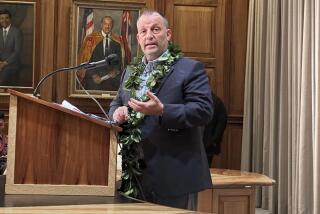New Zealand and France Settle Ship Bombing Dispute
- Share via
PARIS — France and New Zealand have settled their bitter dispute over the blowing up and sinking of the Greenpeace ship Rainbow Warrior by French agents, officials in Paris and Wellington announced Monday.
Under terms of an agreement worked out by U.N. Secretary General Javier Perez de Cuellar, France will formally apologize for sinking the vessel in Auckland harbor last year and pay $7 million in damages. New Zealand will release two French intelligence agents, who were sentenced to 10 years in prison, to spend the next three years at a French military base on a South Pacific island.
Perez de Cuellar made no comment on the bombing itself or on New Zealand’s charge that the attack was an “act of international state-backed terrorism.”
Fernando Pereira, a Dutch crew member and photographer, died in the incident.
Greenpeace said New Zealand’s decision to approve the agreement was understandable.
“We do think New Zealand was owed an apology and some compensation, and it seems they have now got that,” said Brian FitzGerald, a spokesman at the environmental group’s headquarters in Lewes, southern England.
No Objection to Transfer
The group said it had no objection to the transfer of the two agents to a French island. “Where they serve their sentences is not really our area,” he said.
The attack on the vessel had poisoned French-New Zealand relations. France imposed trade sanctions on New Zealand as part of an effort to gain its agents’ release.
Premier Jacques Chirac told reporters in Paris that France accepted the deal “without reservation.”
In Wellington, New Zealand Prime Minister David Lange said the transfer of the agents, which he had previously said he would not permit, was “an appropriate outcome, be it unexpected.”
The Rainbow Warrior, part of Greenpeace’s militant ecological activism, was in New Zealand preparing to monitor French nuclear testing in the South Pacific when it was mined and sunk on July 12, 1985.
Most Slipped Away
Most of the French agents involved in the attack slipped out of New Zealand in the following days, but Cmdr. Alain Maffart and Capt. Dominique Prieur were arrested, convicted of manslaughter and sentenced to the 10--year terms.
Gaining their release became a major political goal in France, and getting them out is a triumph for Chirac, who leads a conservative coalition that defeated the incumbent Socialists in elections last March.
The two agents are to be transferred by July 25 to Hao, a Polynesian island where France has a military base.
They must not leave the island for three years, unless both governments agree, but may live with their families and meet with friends. Contacts with the press are forbidden.
Chirac’s spokesman, Denis Baudouin, said the two will be given military assignments at the base. Three years is the normal length of a French overseas military posting.
Compromise Settlement
“In the eyes of the New Zealanders, they still have a sentence to finish,” he said.
The French payment was a compromise between New Zealand’s demand for $9 million and a French offer of $4 million, according to a statement issued by Baudouin.
According to French officials, Perez de Cuellar’s report said the payment is intended to compensate New Zealand for the cost of the investigation and court proceedings, the violation of its sovereignty and the indignation suffered by New Zealanders.
Greenpeace is pursuing its own compensation claims against France but has not disclosed how much it is asking.
Under the accord, France may not try to block imports of New Zealand mutton, goat meat or butter into the European Common Market.
A three-member tribunal is to be set up to arbitrate any disputes over the agreement.
French President Francois Mitterrand, who was bound for Moscow when the accord was announced, said he “rejoiced like all the French at the happy outcome.”
Former Defense Minister Charles Hernu, who was forced to resign in a wave of outrage over the capture of the agents--there was never much criticism in France of the attack itself--said he was “happy to see the fate of these two French officers finally settled.”
More to Read
Sign up for Essential California
The most important California stories and recommendations in your inbox every morning.
You may occasionally receive promotional content from the Los Angeles Times.










